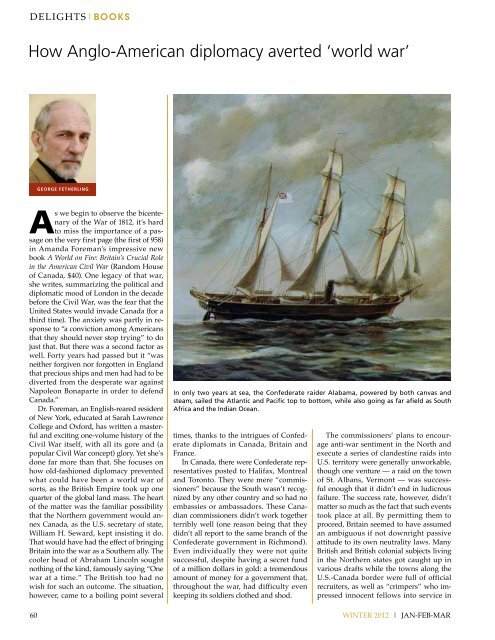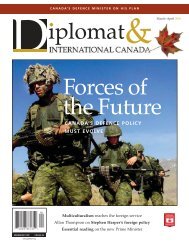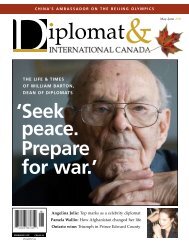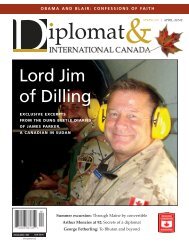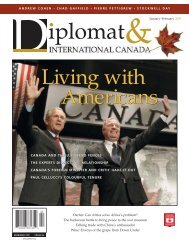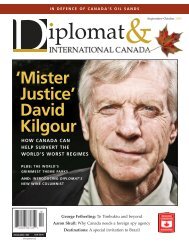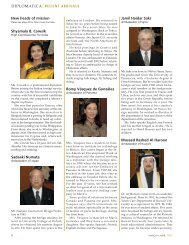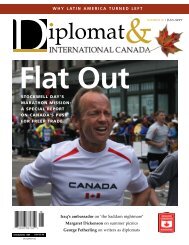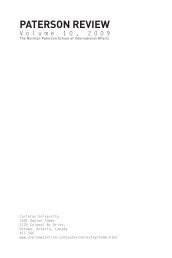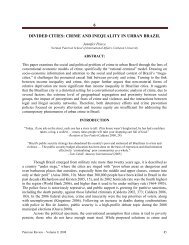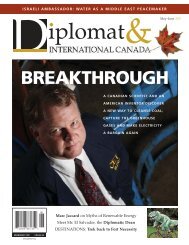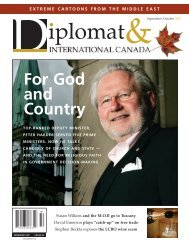DELIGHTS|BOOKSHow Anglo-American diplomacy averted ‘world war’george fetherlingAs we begin to observe the bicentenaryof the War of 1812, it’s hardto miss the importance of a passageon the very first page (the first of 958)in Amanda Foreman’s impressive newbook A World on Fire: Britain’s Crucial Rolein the American Civil War (Random Houseof Canada, $40). One legacy of that war,she writes, summarizing the political anddiplomatic mood of London in the decadebefore the Civil War, was the fear that theUnited States would invade Canada (for athird time). The anxiety was partly in responseto “a conviction among Americansthat they should never stop trying” to dojust that. But there was a second factor aswell. Forty years had passed but it “wasneither forgiven nor forgotten in Englandthat precious ships and men had had to bediverted from the desperate war againstNapoleon Bonaparte in order to defendCanada.”Dr. Foreman, an English-reared residentof New York, educated at Sarah LawrenceCollege and Oxford, has written a masterfuland exciting one-volume history of theCivil War itself, with all its gore and (apopular Civil War concept) glory. Yet she’sdone far more than that. She focuses onhow old-fashioned diplomacy preventedwhat could have been a world war ofsorts, as the British Empire took up onequarter of the global land mass. The heartof the matter was the familiar possibilitythat the Northern government would annexCanada, as the U.S. secretary of state,William H. Seward, kept insisting it do.That would have had the effect of bringingBritain into the war as a Southern ally. Thecooler head of Abraham Lincoln soughtnothing of the kind, famously saying “Onewar at a time.” The British too had nowish for such an outcome. The situation,however, came to a boiling point several60In only two years at sea, the Confederate raider Alabama, powered by both canvas andsteam, sailed the Atlantic and Pacific top to bottom, while also going as far afield as SouthAfrica and the Indian Ocean.times, thanks to the intrigues of Confederatediplomats in Canada, Britain andFrance.In Canada, there were Confederate representativesposted to Halifax, Montrealand Toronto. They were mere “commissioners”because the South wasn’t recognizedby any other country and so had noembassies or ambassadors. These Canadiancommissioners didn’t work togetherterribly well (one reason being that theydidn’t all report to the same branch of theConfederate government in Richmond).Even individually they were not quitesuccessful, despite having a secret fundof a million dollars in gold: a tremendousamount of money for a government that,throughout the war, had difficulty evenkeeping its soldiers clothed and shod.The commissioners’ plans to encourageanti-war sentiment in the North andexecute a series of clandestine raids intoU.S. territory were generally unworkable,though one venture — a raid on the townof St. Albans, Vermont — was successfulenough that it didn’t end in ludicrousfailure. The success rate, however, didn’tmatter so much as the fact that such eventstook place at all. By permitting them toproceed, Britain seemed to have assumedan ambiguous if not downright passiveattitude to its own neutrality laws. ManyBritish and British colonial subjects livingin the Northern states got caught up invarious drafts while the towns along theU.S.-Canada border were full of officialrecruiters, as well as “crimpers” who impressedinnocent fellows into service inWINTER 2012 | JAN-FEB-MAR
BOOKS|DELIGHTSa kind of low-grade kidnapping. And ofcourse individuals of many other nationalitiesrushed to America to join the onearmy or the other.The United States and Britain cameclosest to declaring war on each other inthe first year of the conflict. In November1861, an American warship, the SanJacinto, commanded by Charles Wilkes,stopped a British mail packet, the Trent, ininternational waters off the Bahamas andabducted the Confederate commissionersto London (James M. Mason) and Paris(<strong>John</strong> Slidell). The pair were taken to Bostonand imprisoned. Americans cheeredand Britons fumed. Whitehall respondedwith demands so stern that Prince Alberthimself intervened to soften the language,though the terms remained intact: releaseof the two men and a full explanation forsuch a blatant violation of internationallaw. The deadline for an answer wasseven days. While the British governmentawaited the response, it quicklymade plans for strengthening Canada’sdefences. Britain’s minister in Washington,Lord Lyons, privately informed the hawkishWilliam Seward of the reply’s contentsbut waited until December 23 to deliverit officially. That gave him just enoughtime to lower the diplomatic temperature.At a cabinet meeting on Boxing Day, theAmericans sent a sheepish note deploringCaptain Wilkes’ actions and promising releaseof the two prisoners in January.In only two years at sea, the Confederateraider Alabama, powered by bothcanvas and steam, sailed the Atlantic andPacific top to bottom, while also going asfar afield as South Africa and the IndianOcean. Its ship’s motto was Aide-toi, etDieu t’aidera — “Help yourself and Godwill help you.” Of the total of 158 U.S.ships destroyed by the impoverishedConfederate Navy, the Alabama sank 65of them. Its exploits made it, in Dr. Foreman’swords, “the most famous ship afloat[as the] entire English-speaking worldknew her history.” But it would not beafloat much longer. It lost a duel with theUSS Kearsarge off France in mid-1864.In some ways, however, the Alabamawas only representative of a much broadereffort.As soon as the war got underway, theUnited States began blocking Southernports on the Atlantic (and later New Orleansas well), launching its strategy oftrying to starve the Southerners to death.All the South could do was to build shipsoverseas both to harass U.S. commerceand run the blockade where possible.Remember that Rhett Butler of Gone withthe Wind was a blockade-runner by profession.What you won’t learn from the filmis that he was probably using a ship builtin England or France with financial helpfrom the members of the Royal Exchangein London or cotton brokers in Liverpool.Having no access to Southern ports, Confederatewarships like the Alabama, andso many others, were born in Britain orEurope and never saw their home country,for they stalked the world’s shippinglanes, resupplying in whatever neutralports would have them. Like sharks, theynever slept.So desperate was the Confederategovernment for ships that it tried to buysome from China. In his new, but posthumouslypublished, book The Alabama, BritishNeutrality, and the American Civil War(Indiana University Press, US$22.95), theAmerican historian Frank J. Merli calls thecoveted Chinese flotilla a “paranaval force,a squadron of some six or eight ships ofa class that contemporary terminologymight designate coastguard cutters.” Anotherhistorian has called it a “mosquitofleet.” In the end, the deal fell throughowing to a failure of diplomacy by thevarious parties.U.S. secretary of state William H. SewardCanada is where the Anglo-Americanwar, if there were to be one, would havebroken out.Canadians were overwhelminglyagainst slavery (which <strong>John</strong> Graves Simcoehad outlawed in Upper Canada inthe 1790s). So, too, were Britons not connectedto one of the manufacturing citiesin the Midlands or to big capital generally.But the English intelligentsia and others,indeed much of the Empire, endorsedthe Confederacy, or at least the idea of it.Caught between the lines, so to speak,diplomats had to tread carefully, at leastin public. Lord Lyons confided in a letterto Lord Russell, the foreign secretary, thatSeward had some plan to tour England ona good-will mission. The British knew itwould turn into an ill-will mission instead.Lord Palmerston, the prime minister,joined in, telling Lord Russell that Secre-diplomat and international canada 61


